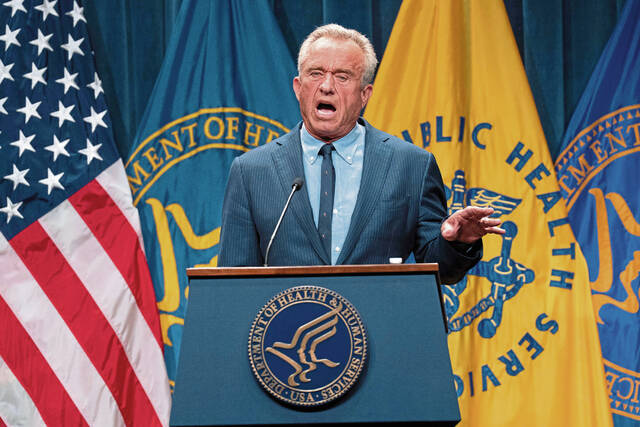https://triblive.com/news/world/medical-experts-slam-kennedys-dismissal-of-cdc-vaccine-advisers/
Medical experts slam Kennedy’s dismissal of CDC vaccine advisers

Health Secretary Robert F. Kennedy Jr.’s decision to remove every member of the Centers for Disease Control and Prevention’s vaccine advisory committee has sparked major outcry among the health care community.
Some medical experts, including doctors in Western Pennsylvania, say he has created a hostile environment for vaccines.
On Monday, Kennedy, who has a history of anti-vaccine viewpoints, announced a complete sweep of the Advisory Committee on Immunization Practices, leaving 17 open positions on the panel.
Dr. Amesh Adalja, a Pittsburgh-based infectious disease expert, said Kennedy’s decision creates hesitation for vaccine development.
“If you’re a biotech or pharmaceutical company and you’re thinking about what to invest in, what to research, what to work on, vaccines are probably the least attractive thing because of all these shifting sands and … all of these political minefields,” said Adalja, who is a senior scholar at the Johns Hopkins Center for Health Security.
Dr. Paul Offit, a vaccine expert at Children’s Hospital of Philadelphia, said he believes Kennedy has removed years of expertise.
“The irony of RFK Jr. is he says, … ‘I wanted to alter this committee so that I can once again have people trust the ACIP.’ The opposite is true. People now don’t trust the ACIP,” Offit said.
Dr. Syra Madad, an infectious disease epidemiologist at Harvard’s Belfer Center, said public health decisions should be rooted in data rather than misinformation.
“What we’re witnessing is a dangerous politicization of health policy,” she said Tuesday.
Although Adalja said he was not surprised to learn of the news, he has concerns about the ripple effect on the general public.
“It’s going to be harder and harder for the individual to find trusted sources of information when the usual process has been completely upended by RFK,” he said.
Multiple health care organizations have turned to social media to voice their outrage.
Dr. Craig Spencer, an emergency physician and associate professor at Brown University, took to social media Monday, outlining the importance of a functioning advisory vaccine committee in an X thread containing statements from several health care organizations.
I was seeing patients in the ER when I got a text from a friend"How bad is this thing about RFK Jr removing ALL 17 experts from a CDC vaccine advisory committee?"
Theres been a lot of hot takes on here already
But heres why this makes me worry, from a clinical perspective ???? https://t.co/oO4TV1Pl4d
— Craig Spencer MD MPH (@Craig_A_Spencer) June 10, 2025
Kennedy’s move “will cripple the health care system’s ability to prepare for the fall respiratory season,” the American Academy of Family Physicians said in an X post.
Similarly, a post from The American Academy of Pediatrics said, “Families and children will be the ones to pay the price for this decision.” The American Medical Association posted that Kennedy “undermines trust and upends a transparent process that has saved countless lives.”
Allegheny Health Network and Independence Health System declined to comment on how Kennedy’s decision could impact overall health care. Officials at UPMC did not return messages seeking comment.
The entire board of committee members were appointed during the Biden administration. Kennedy has not yet released the names of those who will fill the open positions. He said the new panel plans to convene June 25-27 at the CDC headquarters in Atlanta.
Offit and Adalja criticized Kennedy’s future picks for the committee, whoever they may be.
“He’ll just stock (the ACIP) with like-minded people who like him — or anti-vaccine activists or conspiracy theorists or science denialists,” Offit said. “I think he will do everything he can to make vaccines more feared.”
“I’m not confident that anybody that he puts in place is going to have whatever credentials they might have on paper,” Adalja said. “I don’t have any confidence that the ACIP is going to be a functional or useful organization.”
Although Offit said he is waiting to see who Kennedy appoints before providing recommendations to the public, Adalja said people should turn to professional health care organizations such as the American College of Physicians, the American Academy of Pediatrics or the Infectious Disease Society of America, rather than the government, for health guidance.
“It’s going to fall to professional organizations to be able to give the general public recommendations,” he said. “They’re going to have to step up and fill that void.”
Copyright ©2026— Trib Total Media, LLC (TribLIVE.com)
